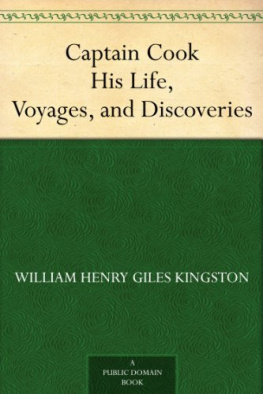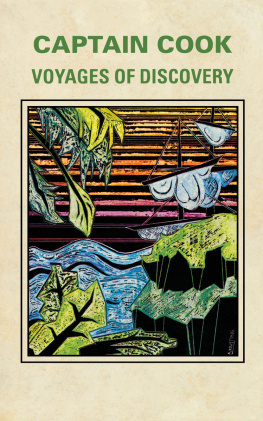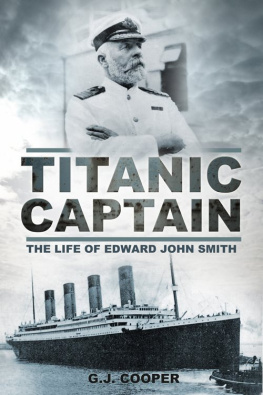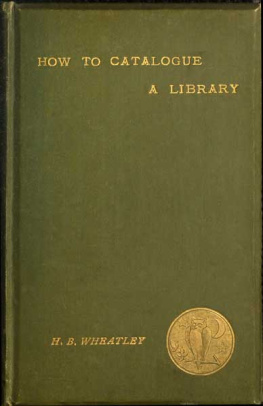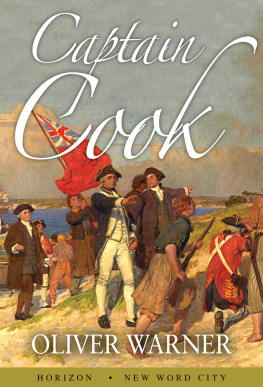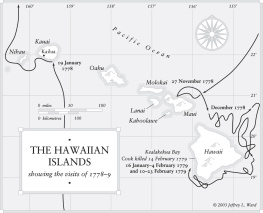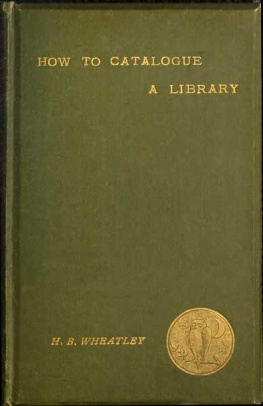W.H.G. Kingston
"Captain Cook"
Chapter One.
Captain CookHis Life, Voyages, and Discoveries.
Early Training.
Among all those Englishmen who, from a humble origin, have risen to an honourable position, Captain James Cook is especially worthy of record. His parents were of the peasant classhis father having commenced life as a farm-labourer, and his mother being a cottagers daughter. Probably, however, they were both superior to others of the same station, as the husband, in process of time, became farm-bailiff to his employera Mr Thomas Skottowe. This was about the year 1730, and the farm of which he had the management was called Airy-Holme, near Ayton, in Yorkshire. Not far from this place, at the village of Marton, near Stockton-upon-Tees; his son James was born, on October 27, 1728. James was one of nine children, all of whom he survived, with the exception of a sister who married a fisherman at Redcar.
The father of this family spent the latter years of his life with his daughter at Redcar, and was supposed to have been about eighty-five years old at the time of his death; so that he must have had the satisfaction of seeing his son rising in his profession, though probably he little thought of that son as establishing a fame which would be handed down in history.
James Cook does not appear to have enjoyed any peculiar educational advantages, but owed his subsequent advancement chiefly to his own intelligence, perseverance, and diligence. He first went to a village school, and was afterwards sent, at the expense of Mr Skottowe, to an ordinary commercial school, kept by a Mr Pullen. He continued there four years, and was then apprenticed to Mr William Sanderson, a grocer and haberdasher at the fishing town of Straiths, ten miles from Whitby. It may be supposed that the occupation in which he was engaged was not suited to his taste. The sea was constantly before his eyes, and the desire to seek his fortune on it sprang up within him, and grew stronger and stronger, till in about a year after he went to Straiths he obtained a release from his engagement with Mr Sanderson, and apprenticed himself to Messrs Walker and Company, shipowners of Whitby. He went to sea for the first time when he was about eighteen, on board one of their vesselsthe Truelove collier, (Note 1) of four hundred and fifty tons burden, trading between Newcastle and London. The lad soon showed that he was well fitted for his new profession, and in 1748, not two years after he had commenced it, we find him especially directed to assist in fitting for sea the Three Brothers, a new ship of six hundred tons. While he served on board this ship she was hired by Government as a transport; and on her being paid off she was employed in the Norway trade.
After making several voyages in the Three Brothers up the Baltic, young Cook was promoted to the rank of mate on board the Friendship. He had by this time gained the goodwill of his employers; and had made several other friends on shore, who, before long, were enabled to render him essential service. He was now known as a thorough seamen; indeed, from the moment he went on board ship, he had steadily applied his mind to acquiring a knowledge of his profession. Still he served on as mate of the Friendship till the breaking out of the war between England and France in 1756, when he made up his mind to push his fortunes in the Royal Navy. He knew that at all events there was a great probability of his being pressed into the service, and he had good reason to hope that he might be placed ere long on the quarter-deck, since many young men at that time had been who went to sea, as he had done, before the mast. He accordingly volunteered, and entered as an able seaman on board the Eagle, of sixty guns, then commanded by Captain Hamer, but shortly afterwards by Captain Palliser, who became the well-known Sir Hugh PalliserCooks warm and constant friend.
As soon as the young sailors Yorkshire friends heard that he had entered on board a man-of-war, they exerted themselves on his behalf, and a letter of introduction was procured from Mr Osbaldeston, Member for the county, to his captain, who, having already remarked the intelligence and assiduity Cook exhibited in all his professional duties, was the more ready to give him a helping hand.
Considering how best he could assist the young man, who had served too short a time in the Navy to obtain a commission, Captain Palliser advised that a masters warrant should be procured for himthis being a position for which, both from age and experience, he was well fitted. (Note 2.) This was done; and on May 10, 1759, James Cook was appointed to the Grampus, sloop of war, and was now in a fair way of gaining the object of his ambition. He had, however, to undergo a trial of patience at the first outset of his career; for the former master returning, his appointment was cancelled. His friends were not idle, and four days after this he was made master of the Garland; but on going to join her he found that she had already sailed for her destination. On the following day, May 15, he was appointed to the Mercury, on the point of sailing for the North American station to join the fleet under Sir Charles Saunders, which, in conjunction with the army under General Wolfe, was engaged in the siege of Quebec. The termination of that contest gained for Great Britain one of her finest provinces. To this success Cook contributed in his particular department; and it is remarkable that he should have been in various ways instrumental in giving to his country the three finest provinces she possessesCanada, the Australian settlements, and New Zealand.
James Cook was now about thirty-two years of age, and although the position in life he had filled for the previous twelve years was not one (especially in those days) conducive to refinement of manners, he appears from the first to have conducted himself with propriety and credit. He had already shown his superiority as a seaman. He was now to exhibit his talents in the more scientific part of his profession, in which officers in the Navy were in those days greatly deficient.
It was necessary to take the soundings in the channel of the Saint Lawrence, between the Isle of Orleans and the north shore, directly in front of the French fortified camp of Montmorency and Beauport, in order to enable the admiral to place his ships so as to oppose the enemys batteries, and to cover the projected landing of the British army under Wolfe, and a general attack on their camp. Captain Palliser, who now commanded the Shrewsbury, a seventy-four gun ship, recommended Cook for this difficult and dangerous service. He was engaged on it for many consecutive nights, it being a work which could not be performed in the daytime. At length his proceedings were discovered by the French, who laid a plan to catch him. They concealed in a wood near the water a number of Indians with their canoes. As the Mercurys barge, in which Cook was making the survey, passed, the canoes darted out on him and gave chase. His only chance of escape was to run for it. He pushed for the Isle of Orleans with a whole host of yelling savages paddling at full speed after him. On they came, every moment gaining on his boat. The English hospital, where there was a guard, was before him; towards this he steered, the bows of the Indian canoes almost touching the barges stern; a few strokes more, and the Indians would have grappled him. He sprang from his seat over the bow of his boat, followed by his crew, just as the enemy leaped in overwhelming numbers over the quarters. They carried off the barge in triumph, but Cook and his comrades escaped; and he succeeded, in spite of all difficulties, in furnishing the admiral with a correct and complete draft of the channel and soundings. This was the more extraordinary, as Sir Hugh Palliser afterwards expressed his belief that before this time Cook had scarcely ever used a pencil, and knew nothing of drawing; and it is one of many proofs that the ardent seaman not only threw his soul into the duties of his profession, but that this determination enabled him quickly to master every subject to which he applied his mind.
Next page
